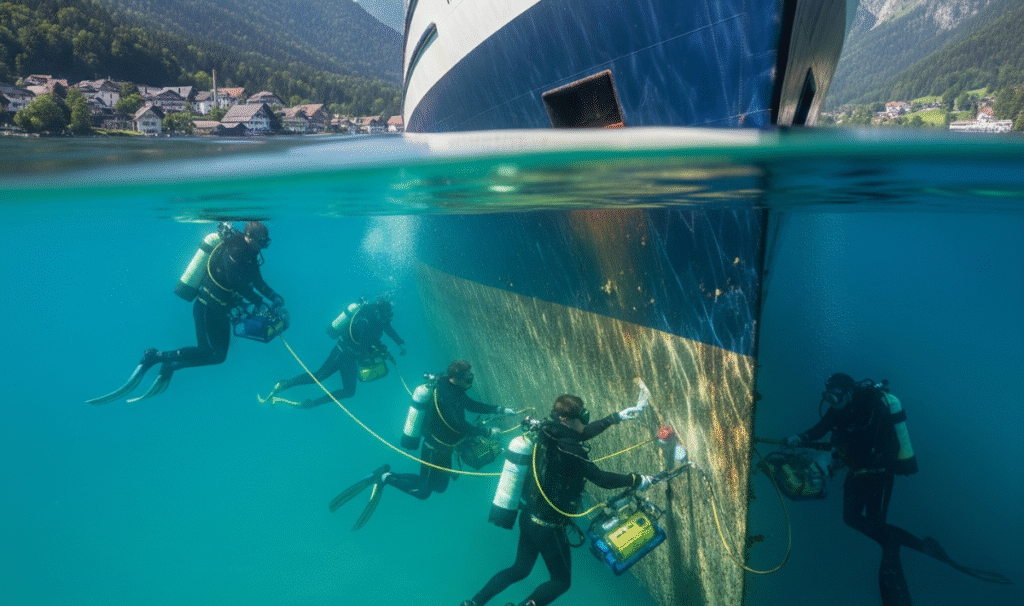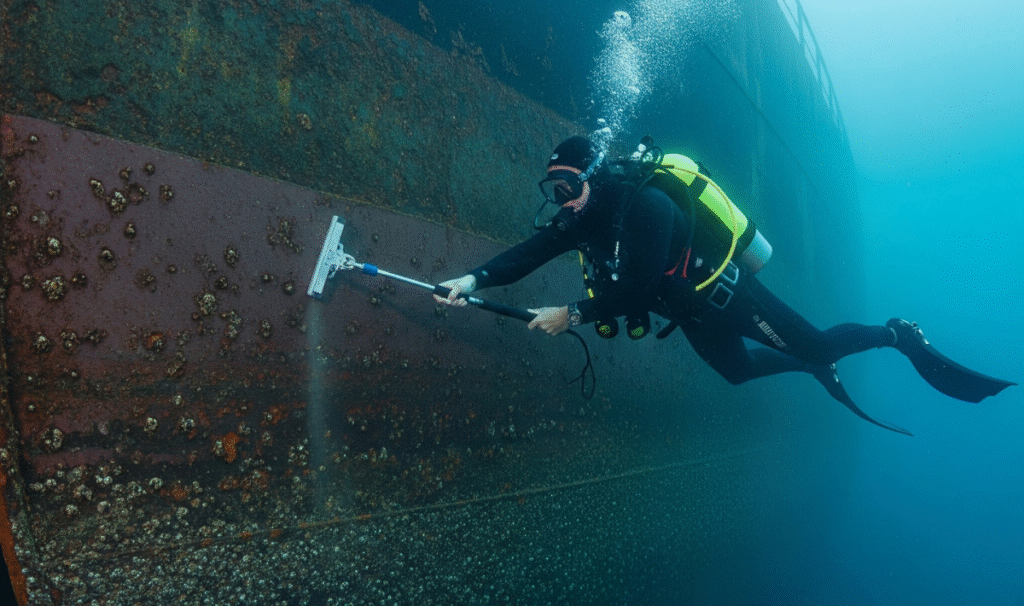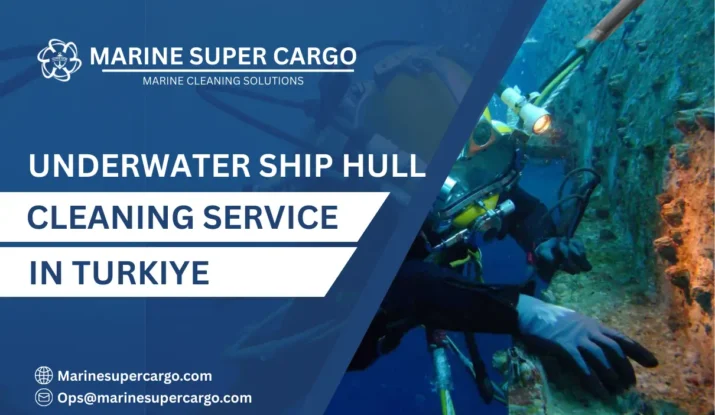Picture sailing across the Bosporus, the sea glittering, your ship moving forward with power. But what you don’t see, beneath the surface, could be slowing you down. Barnacles, algae, and other sea growth attach themselves to the hull like stubborn hitchhikers. As time passes, this invisible drag eats away at speed, fuel efficiency, and profits. That’s where underwater ship hull cleaning in Turkiye steps in—it’s the quiet but powerful solution reshaping efficient shipping in one of the world’s most strategic maritime regions.
The Science Behind Hull Maintenance
The science of hull maintenance lies in keeping a vessel’s submerged surfaces free from biofouling, corrosion, and debris. Instead of relying solely on costly dry docking, underwater hull cleaning uses skilled divers or advanced robotic systems to restore smoothness below the waterline. This process enhances vessel speed, reduces drag, lowers fuel consumption, and preserves structural integrity—ensuring safe, efficient, and environmentally responsible maritime operations across global trade routes.
Why Turkiye’s Maritime Location Matters
Situated between Europe and Asia, Turkiye commands vital waterways like the Bosporus Strait, the Dardanelles, and the Aegean-Mediterranean connection. For vessels constantly transiting these busy lanes, underwater ship hull cleaning in Turkiye is essential. The high traffic, coupled with warm and nutrient-rich waters, accelerates biofouling growth—making regular cleaning a necessity.

The Cost of Biofouling and Drag
Imagine running a marathon with ankle weights—that’s what ships experience when their hulls are fouled. Even a thin layer of barnacles can increase drag significantly, forcing the ship to burn much more fuel. According to imo.org, fouled hulls can increase fuel consumption by 30–40%.
Financial and Operational Gains from Clean Hulls
Regular underwater ship hull cleaning in Turkiye ensures smoother sailing. Shipowners benefit from lower fuel bills, improved speed, and reduced strain on engines. The result? Operational savings that directly boost profitability and sustainability in global shipping.
Preventing the Spread of Invasive Species
Ships don’t just carry cargo—they carry microorganisms on their hulls. These travelers can invade new ecosystems, harming marine biodiversity. The International Association of Ports and Harbors stresses the need for effective hull maintenance to reduce invasive species transfer. Underwater ship hull cleaning in Turkiye plays a vital role in safeguarding the Mediterranean and Black Sea environments.
Compliance with Global Standards: IMO & MARPOL
The MARPOL Convention and IMO guidelines set out clear expectations for pollution prevention and emission reduction. By integrating underwater ship hull cleaning in Turkiye into their routine operations, shipowners align with these global sustainability goals.
Preventing Corrosion and Structural Degradation
Marine growth isn’t harmless—it accelerates rusting and eats away at protective layers. Saltwater trapped in biofouling weakens the hull. Regular underwater ship hull cleaning in Turkiye shields ships from premature wear, extending service life.
Lowering Repair and Dry Dock Expenses
Dry docking halts voyages and costs massive amounts of money. Preventive in-water cleaning means fewer emergency repairs, less downtime, and more savings in the long run. Underwater ship hull cleaning in Turkiye helps shipowners avoid unnecessary disruptions and preserve revenue flow.
Tools and Eco-Friendly Practices in Modern Hull Cleaning
Modern underwater cleaning employs hydraulic brushes, robotic crawlers, and suction systems that capture dislodged debris, as explained by cleanship.co. These eco-wise methods ensure effectiveness while minimizing environmental impact.
Safety Standards Guided by IMCA
Divers work in demanding environments. The International Marine Contractors Association enforces safety standards worldwide, ensuring that underwater cleaning in Turkiye adheres to best practices in diver safety and environmental protection alike.
The Power of the Bosporus and Mediterranean Position
Turkiye’s location gives it unparalleled importance in global shipping. It connects the Black Sea with the Mediterranean, bridging trade between Europe and Asia. Ships passing through these lanes rely heavily on timely underwater ship hull cleaning in Turkiye to maintain efficiency.
Growing Ports and Skilled Maritime Workforce
Ports like Istanbul, Izmir, and Mersin handle high cargo volumes every year, cementing Turkiye’s maritime significance. This growth has cultivated an experienced marine workforce ready to meet demand for specialized underwater cleaning services.
Dispelling Common Misconceptions About Hull Cleaning
Myth: It Harms Protective Hull Coatings
Some argue that cleaning strips away protective coatings. In fact, professional underwater ship hull cleaning in Turkiye uses non-abrasive brushes designed to protect coatings while removing fouling.
Myth: It Damages Marine Ecosystems
Modern hull-cleaning practices collect waste and reduce invasive species transfer, leaving marine ecosystems healthier. Done right, it benefits the oceans rather than harming them.

How Frequently Should Hulls Be Cleaned?
Ships navigating Turkiye’s waters often deal with rapid marine growth. It is recommended to plan underwater ship hull cleaning in Turkiye every 4–6 months for optimal performance.
Choosing Certified, Responsible Providers
Shipowners should always pick providers who comply with IMO rules and IMCA safety protocols while prioritizing eco-responsibility. This ensures ships benefit from cleaning that is both efficient and environmentally sound.
Conclusion
Think of hull cleaning as polishing hidden armor. Just as soldiers wouldn’t march into battle with rusty shields, ships shouldn’t sail with fouled hulls. The benefits of underwater ship hull cleaning in Turkiye—fuel efficiency, environmental protection, and cost savings—are too significant to ignore. In one of the world’s busiest maritime corridors, hull cleaning isn’t just maintenance, it’s strategy. Cleaner hulls mean smoother voyages, stronger profits, and a healthier planet.
FAQ:
Q1. How often should underwater ship hull cleaning in Turkiye be done?
Ideally, every 4–6 months, depending on vessel type and biofouling growth levels.
Q2. Does underwater ship hull cleaning in Turkiye reduce fuel consumption?
Yes. Clean hulls can cut fuel usage by up to 30–40%, directly saving costs and lowering emissions.
Q3. Is underwater ship hull cleaning in Turkiye environmentally friendly?
Yes. Certified professionals use eco-smart methods and debris collection systems to minimize environmental impact.
Q4. Why is Turkiye a critical place for ship hull cleaning?
Its geographical position controls trade between the Black Sea and the Mediterranean, making its ports vital for global shipping efficiency.
Q5. Can regular hull cleaning really extend ship life?
Absolutely. By preventing corrosion, protecting coatings, and reducing damage, regular cleaning significantly extends vessel lifespan.


